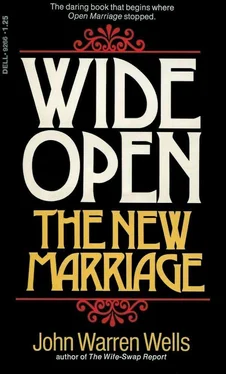John Warren Wells
Wide Open: The New Marriage
“May you live in interesting times.”
The Chinese pronounce that line as a curse. In that sense, we’re all of us accursed, for our times are almost too interesting to be endured. The world is in the midst of an extraordinary period of social change, and the speed of that change gets more and more blinding. No aspect of human life remains untouched.
It is hardly surprising, then, that the institution of marriage as traditionally structured has proved inadequate to a greater or lesser degree for a substantial proportion of the population. One result has been a surge of interest in diverse ways in which the fundamental idea of marriage can be adapted to meet present needs. Various forms of consensual adultery and plural marriage have begun to evolve. It is with these new marital life styles that this book is concerned.
An introduction is a curious thing, written after the text of the book it is to precede. I had originally intended this introduction to contain some general remarks on marriage, and now I find myself more inclined to let the following chapters make their own inferential points in that area. I suspect that a book should be introduced to a reader much as two strangers are introduced at a cocktail party. The host brings them together, mumbles something brief and insubstantial, and then leaves the two to work things out on their own. I’ll do as little mumbling as possible.
The theme of Wide Open called for a departure from my usual form. In the other books I’ve written, case histories were examined one to a chapter, with the objective of revealing individual lives and personalities to the reader as fully as possible. Here, however, our interest is less in specific individuals than in the ways they have come to grips with the traditional monogamous marriage. Thus, each chapter examines not one but several cases, and is supplemented by brief quotes from other interview subjects and capsule summaries of other examples.
All of the names of persons discussed in the pages to follow have been deliberately altered, as have all features which might tend to facilitate identification of them. And let me say that it has been a strain coming up with different names all the way through, and trying to remember which ones I’ve already used.
Finally, a word of apology. I kept having the feeling while writing this book that I was typing the word “relationship” an average of three times to the page. I have since proofread the text and must revise the estimate upward. It’s not a favorite word of mine to begin with, and the most annoying thing about it is its indispensability. If it gets on your nerves, cropping up so persistently, I’m sorry.
John Warren Wells
New York City
April, 1973
“I got a phone call from her two weeks ago. ‘Well, Daddy, I know you’ll be happy to hear that Tommy and I are going to get married.’ Happy? The hell I was happy. He hasn’t got a dime, and he’s got no ambition, and his mother’s an alcoholic, and his father’s been in and out of mental institutions all his life; and she wants to marry him. I said, ‘Listen, why rush into anything? You’ve been living together, you’ve got a good thing going, what’s the rush?’ I don’t mind her living with the bum, I don’t mind supporting them, but why should she ruin her life by marrying the son-of-a-bitch?”
JWW:The speech quoted above is the virtually verbatim outburst of a middle-aged man who could hardly be further removed from the mainstream of the New Morality. He is utterly conventional, and not a liberal in any sense of the word. He lives in a suburb in the industrial Midwest, owns his own business, belongs to the local Rotary Club, attends church irregularly, tries to remember to fly the flag on national holidays, and in short reflects the traditional values of his generation. If his sex drive finds any extramarital expression, he keeps it a closely guarded secret. If any of his friends and neighbors are swingers, he doesn’t know about it and doesn’t want to know.
His daughter lives openly with her lover, and has done so for over a year, with his acquiescence if not his approval. And he desperately wants her to continue to do so rather than marry the man.
I would be hard-pressed to supply a better metaphor for the extraordinary attitudinal change in our thinking concerning premarital cohabitation. Ten years ago it would have been utterly inconceivable for this man to have entertained such a desire, let alone voice it. Ten years ago he would no more have countenanced his daughter’s living with a man without benefit of wedlock than she would have dared let him know about it. And if he did find out about such an arrangement, he would have done everything possible to terminate it, preferably by inducing the couple to marry.
Yet he now takes the position that, bad as it is for his daughter to live with a man he considers unsuitable, it would be infinitely worse for her to marry him.
Other parental attitudes are similarly revealing. A woman told me that her son had recently announced his impending marriage. She liked and approved of her future daughter-in-law, but not without reservations.
“They’ve only been living together for a little over a month. That’s not nearly enough time for two people to get to know each other. They’re still in the honeymoon stage. I’d feel easier about it if they would live together for a few more months.”
JWW:A thoughtful, enlightened, modern attitude. And had this thoughtful, enlightened, modern mother lived with her own husband before marriage? Why, no, she had not. As a matter of fact, she had been a technical virgin on her wedding night. And was her attitude now a reaction against difficulties which had characterized her own marriage? No, not at all. Her own marriage had been spectacularly successful.
“But things are different now. We were lucky, but if I were that age now, oh, I’d never marry a man without living with him first. And for more than a month, too.”
JWW:Another mother’s daughter also lives openly with her lover, and has been doing so for nearly three years. Before this she had lived with another young man for a shorter period of time. The mother, herself divorced, is completely at ease with her daughter’s living arrangement, while drawing wry amusement from the reactions of some of her friends.
“You see, they worry about Sheila. It doesn’t bother them that she’s living with Hal, or if it does, they keep it to themselves. Their attitude is that it’s all well and good, so long as the two of them get married sooner or later. And as the years go by, they grow concerned. If he hasn’t married her by now, they figure he never will. Well, it’s very possible that the two of them will never get married. They may separate, they may just go on as they are. That’s their business, not mine, and the fact that they’re happy now is all that’s important to me. I suppose they’ll want to get married if and when they want to have children. But they may decide not to have children. Or they may decide to have them without going through a marriage ceremony. All I can say is that they’re lucky they have these options. I never did.”
JWW:Nor did anyone a generation ago have the option of public cohabitation. This is not to say that unmarried couples did not live together. They did, but to a substantially lesser degree, and only under certain circumstances. The typical cohabiting couple consisted of persons living in a large city with no relatives residing nearby. Living arrangements were kept a secret — not only from parents, but also from employers, business associates, and all but close friends. Those more adventurous souls who aggressively let the world know that they shared a bed without sharing a last name usually turned out to be considerably less aggressive insofar as parents were concerned.
Читать дальше











